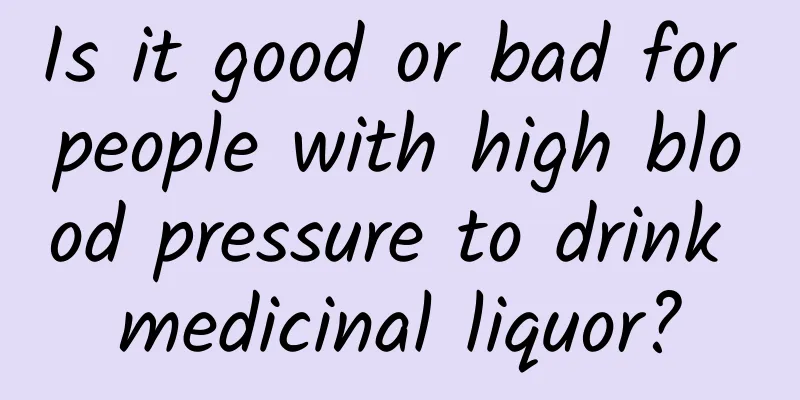Is it good or bad for people with high blood pressure to drink medicinal liquor?

|
A friend asked Huazi a question: Can people with high blood pressure drink wine soaked with Chinese medicine? For example, is it harmful to the body to soak wine with nutritious products such as wolfberry and ginseng that can nourish the body? Huazi replied that it is not recommended for people with high blood pressure to drink alcohol, even if it is medicinal wine. It has nothing to do with what is used to soak the wine. It is the alcohol that affects the human body. Many people believe that drinking small amounts of alcohol is good for the body, but the world-renowned medical journal The Lancet has published relevant research results, confirming that no matter how little alcohol is consumed, the human body will not benefit from it. 1. What is the use of making medicine into medicinal wine? Making medicinal materials into medicinal wine is a method of making medicine in traditional Chinese medicine. There are two purposes. First, the active ingredients in some medicinal materials are insoluble in water and can only be dissolved in organic solvents, and alcohol (ethanol) is an organic solvent that is easier to obtain in ancient times. Second, high concentrations of alcohol have a bactericidal effect, which can kill harmful microorganisms and parasites in medicinal materials, produce an antiseptic effect, and are conducive to the long-term preservation of drugs. Therefore, strong liquor is most suitable for making medicinal wine. The higher the alcohol concentration, the more active ingredients of the medicine will be dissolved, and the better the antiseptic effect. However, when drinking medicinal wine, it is inevitable that it will be affected by the alcohol in it. 2. The effect of alcohol on the human body When alcohol (ethanol) enters the human body, the metabolic process is mainly divided into two steps. The first step is that it is dispersed into acetaldehyde by alcohol dehydrogenase in the liver, and the second step is decomposed into acetic acid by acetaldehyde dehydrogenase. Acetic acid can continue to decompose into water and carbon dioxide, while releasing a large amount of energy. The acetic acid produced during the decomposition of alcohol is not toxic, but both ethanol and acetaldehyde are toxic to the human body. The more obvious reaction is to combine with the central nervous cells, producing an effect of first excitement and then inhibition, causing slow brain activity. If you drink a lot of alcohol for a long time, it will damage the central nervous cells, causing nerve cell death, resulting in a decline in memory, analytical ability and attention. Alcohol affects the circulatory system and in the short term can cause blood vessels to dilate, headaches, facial flushing, and a drop in blood pressure. For people with high blood pressure, drinking alcohol while taking antihypertensive drugs may cause low blood pressure and induce cardiovascular and cerebrovascular accidents. The long-term effect of alcohol on the human body is to increase blood pressure. Medical research has confirmed that drinking is one of the important factors that induce high blood pressure, and the extent of blood pressure increase is proportional to the amount of alcohol consumed. Alcohol is mainly metabolized in the liver, which will interfere with the liver drug enzyme system, affect the metabolism of other drugs, and affect the normal efficacy of the drugs. 3. If you really can't help it, drink less. From the perspective of the impact of alcohol on the human body, it is best for health to "not drink at all". Alcohol not only affects the brain nerves and causes blood pressure fluctuations, but it also stimulates appetite, causing people to eat more food when drinking, causing increased blood lipids and increasing the risk of cardiovascular and cerebrovascular diseases. If you can't quit drinking completely, then try to drink as little as possible. In terms of alcohol, no more than 25 grams a day. After conversion, it is about the amount of 1 liang of liquor, or a glass of wine, or a bottle of beer. It is recommended to choose wine because it contains resveratrol, which is beneficial to the human body. Although the content is not much, it is better than nothing, and is better for health than liquor and beer. Some people may ask, if you can't drink alcohol, what should you do if you need to use Chinese medicine to make wine? Huazi said that in fact, most Chinese medicines can be dissolved by boiling them in water. If it is a tonic like wolfberry or ginseng, you can slice it, crush it and take it directly. Many Chinese herbal medicines that originally needed to be soaked in wine are now extracted by pharmaceutical factories through modern methods and made into corresponding granules, which are more effective than soaking in wine. And when taking, you can just rinse with water, no need to drink alcohol. If it is really the kind of medicine that must be soaked in wine to work, try to drink less. In summary, even drinking a small amount of alcohol has no benefit to the human body. People with high blood pressure are not recommended to drink alcohol, including medicinal wine. People who cannot completely quit drinking need to control their drinking amount, and the daily alcohol intake should not exceed 25 grams. I am pharmacist Huazi, welcome to follow me and share more health knowledge. |
>>: What season is passion fruit (an autumn fruit with the reputation of the king of juice)
Recommend
What are some good places to visit in Harbin? What to eat in Harbin?
Harbin is known as the "Ice City". When...
Female left back pain
If female friends experience pain on the left sid...
How to maintain a 50-year-old woman
The skin of a 50-year-old woman has experienced a...
Why do I bleed after years of amenorrhea?
After menopause, various functions in women's...
How to maintain the uterus?
In our daily life, many women always do whatever ...
What to do if you can't sleep at night during early pregnancy
After a woman becomes pregnant, her body will und...
Can I eat blood-enriching foods during menstruation?
Many women know that the monthly menstruation wil...
Stress "harms the intestines" and causes cancer? Research reveals new truth about the increased risk of breast cancer
As the pace of society accelerates, psychological...
DCCI: Sharing of 2012 Mobile Application Ecosystem Data
In May 2012, DCCI released a 2012 mobile applicat...
What are the effects of staying up late on your skin? How to maintain your skin after staying up late
Staying up late will make our body's collagen...
Luteinized ovarian cyst
Ovarian luteinized cysts, also known as ovarian l...
What causes uterine prolapse?
With the accelerated pace of modern life, many wo...
What is the difference between kale and mustard greens?
The stalks of Chinese kale are tender, crisp, swe...
Is it normal for women to have odor in their private parts?
The odor in women's lower body is a typical g...









